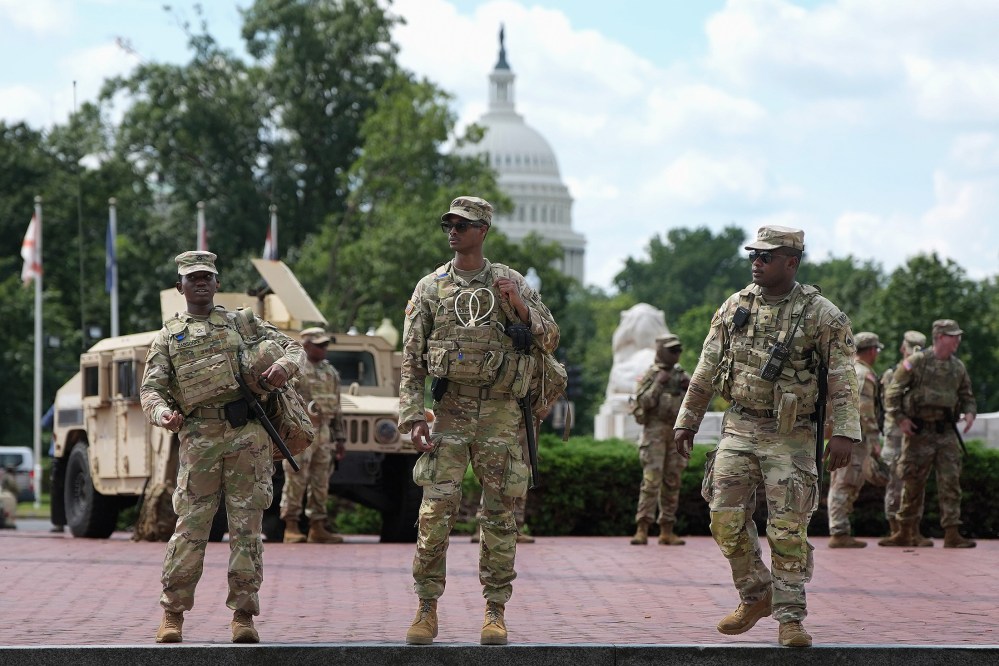President Donald Trump faced few obstacles when he decided to send the National Guard into Washington, D.C., because it’s not a state.
As he looks to expand the effort to New York, Chicago and Baltimore, former military officials expect state officials to clash with the president, but say that ultimately Trump has pretty broad authority to do it anyway.
Retired Major Gen. Randy Manner, a former acting vice chief of the National Guard Bureau, told MSNBC that “it’s absolutely legal” for the president to take control of National Guard troops and send them wherever he wants.
Manner asserted the end result will “intimidate” Americans in cities politically at odds with the president, rather than tackle crime.
“That’s the thing that’s very disturbing. A reasonable president has never done this, but we’re not dealing with that,” he said. “It doesn’t make it right. It makes it legal.”
Illinois Gov. JB Pritzker and Maryland Gov. Wes Moore, both Democrats, have harshly criticized Trump’s threats to send troops to their cities, saying it’s based on a manufactured crisis and is an overreach of presidential powers.
“This is the militarization of America, and it is an absolute seizing control of our country through our own military used against us,” said Manner, who served in the Army and National Guard for 35 years.

If Trump follows through on the threat, the administration will likely face quick lawsuits from the states, especially if it attempts to send the National Guard to conduct law enforcement duties.
Trump could simply ask any governor to send the National Guard into a city. Notably, FBI data from 2024 shows that 13 of the 20 cities with the highest murder rates are in Republican-led states. Though Trump might get a better reception with a Republican governors in one of those states, he has so far focused only on cities in Democratic-led states.
In those cases, he would instead have to federalize troops, following the pattern set when he ordered National Guard troops to Los Angeles in early June.
In that scenario, Trump is relying on Title 10 of the U.S. Code, which allows the president to take control of National Guard troops if the country is facing an invasion or rebellion or the president is “unable with the regular forces” to enforce the law.
He could also potentially invoke the 1972 Insurrection Act to send in the National Guard or active-duty troops, over a governor’s objections, to enforce federal laws and to suppress insurrections or rebellions there.
California Gov. Gavin Newsom sued over the LA deployment and a trial was held earlier this month in a federal court in San Francisco, but a judge has not issued a ruling yet. Washington, D.C.’s attorney general is also seeking to stop the deployment there in a lawsuit based on a law about the governance of the district.
Retired Rear Adm. Jim McPherson, who served as undersecretary of the Army during Trump’s first term, called Los Angeles “the blueprint” for Trump sending the National Guard into other major cities.
McPherson, who also served as general counsel of the Army during Trump’s first term, was pessimistic about any law, especially the now often-cited Posse Comitatus Act, stopping Trump’s plans.
Under an 1878 law known as the Posse Comitatus Act, the military is largely prohibited from carrying out civilian law enforcement duties — or effectively performing local police actions. But that law has rarely been tested in court and it’s unclear how the legal challenges to Trump’s actions will fare.
“To say that we’re protected by the Posse Comitatus Act is a fallacy — scary,” he said. In part, because it’s a charge that can only be brought by a U.S. attorney, chief government litigators who serve under the direction of Attorney General Pam Bondi.













